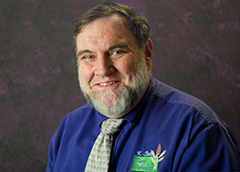March 22, 2013
Foreign exchange: Fulbright experience fulfilling for university distinguished professor
Submitted by Communications and Marketing

Kansas State University's John Leslie, a university distinguished professor and head of the department of plant pathology, knows what a life-changing experience it is to become a Fulbright scholar.
"A Fulbright is amongst the most prestigious awards you can win as an academic and it can really change the way that you look at the world and yourself," Leslie said.
Through a new partnership with the Australian-American Fulbright Commission, Kansas State University will sponsor two different Fulbright scholarships -- one for an Australian senior scholar and the first Fulbright distinguished chair designated for an Australian. The partnership makes the university the first U.S. educational institutional partner of the Australian-American Fulbright Commission.
"Fulbright exchanges are one of the best experiences you can have as a faculty member," Leslie said.
He spent eight months at the University of Sydney with Professor Lester Burgess and at the Royal Botanical Gardens in Sydney with Brett Summerell, collaborating on fungal research. Fusarium, a common fungus in both Kansas and Australia, poses challenges to agriculture and threatens food safety and the food supply in both places.
While Leslie gained a wealth of knowledge during his eight-month visit, he also came home with an appreciation for a different culture.
"From here, Australia doesn't look like a very different culture from ours, but once you're in the middle of it, it is a very different culture," he said.
To gain a full understanding of life at the University of Sydney, Leslie decided to stay at St. Paul's College. Colleges at Australian universities are a bit of a hybrid between a typical American residence hall and fraternity house. Much like a residence hall, St. Paul's College has about 300 students and, similar to a fraternity, it is all male, selective about who is allowed to live there and has its own activities for residents.
"When the universities in Australia were established, there was great debate about whether they would be religious institutions or sponsored by the state," Leslie said. "It was decided the universities would be state-funded. The colleges were established at the universities as places to provide religious instruction and most of these colleges still have connections to their founding churches."
Leslie was named an honorary fellow at St. Paul's College in 2005, a high honor in Australia. He was the first foreign fellow for the college.
Leslie has continued collaborating with researchers in Australia. He and Summerell coordinate the Fusarium Laboratory Workshop, which brings researchers and professionals from across the world to Kansas State University to learn about these fungi, the diseases they cause and the toxic compounds they can produce.
"It is critical that we collaborate globally," Leslie said. "We don't live in isolation. Working with other universities provides Kansas State University faculty, staff and students insight into global issues and how we can help solve problems of local, regional, national and international importance."
Leslie said his experience as a Fulbright scholar has done more than just broaden his intellect.
"A different culture makes you look at your values and gives you insights into yourself," he said.
